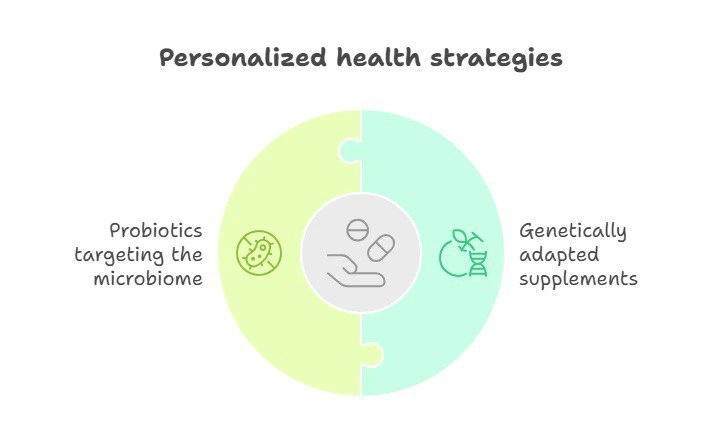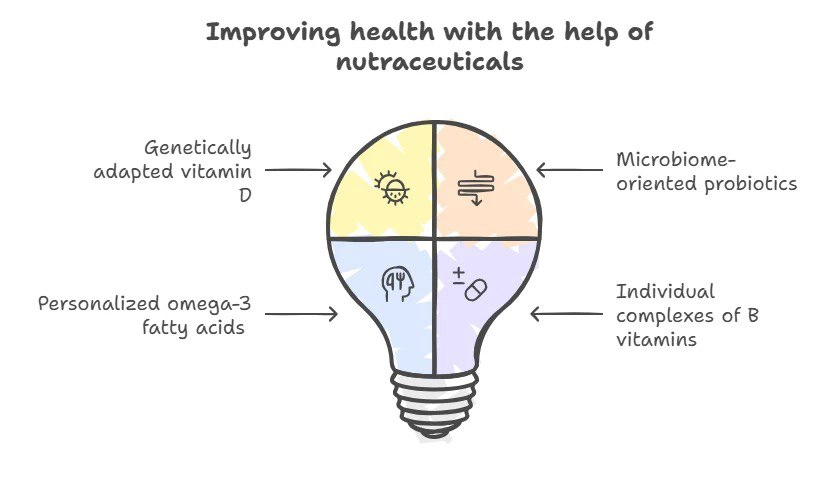

Modern science is increasingly focused on an individualized approach to health, and nutraceuticals are no exception.
Personalized nutraceuticals offer solutions tailored to each individual’s genetic, metabolic and lifestyle characteristics.
In this article, we will review the latest research on personalized nutraceuticals, their benefits and practical recommendations for daily use.

New directions in personalized nutraceuticals
Personalized nutraceuticals use data on genetics, microbiome and lifestyle to create customized nutrition and supplement regimens.
This allows for better health maintenance and disease prevention.
Genetically adapted vitamins and minerals
Current research shows that genetic variations can affect the absorption and effectiveness of vitamins and minerals.
For example, people with certain genetic markers may need higher doses of vitamin D or magnesium.
Microbiome-oriented probiotics
The gut microbiome plays a key role in immunity and metabolism.
Personalized probiotics take into account the unique composition of each individual’s microflora to better support gut health and overall wellness.
The health impact of personalized nutraceuticals
Personalized nutraceuticals can significantly improve various aspects of health by fine-tuning supplements to meet individual needs.
Improved immune function
Individualized vitamin and mineral supplementation regimens can help strengthen the immune system, especially during periods of high blood pressure or stress. Genetically adapted supplements such as vitamin C and zinc can increase resistance to infections.
Support for cognitive functions
Personalized nutraceuticals that include omega-3 fatty acids and B vitamins help improve memory and concentration and reduce the risk of neurodegenerative diseases.
Scientific research and evidence of effectiveness
Many studies support the benefits of personalized nutraceuticals in the prevention and treatment of various conditions. Below are key studies demonstrating their effectiveness.

Table 1: Personalized nutraceuticals and their benefits
| Nutraceuticals | Advantages | |
|---|---|---|
| Genetically adapted vitamin D | Increased digestibility and efficiency | |
| Microbiome-oriented probiotics | Improved gut health and immunity | |
| Personalized omega-3 fatty acids | Cognitive and cardiovascular support | |
| Individualized B vitamin complexes | Improvement of energy metabolism and nervous system |

Importance of personalization in the choice of nutraceuticals
Personalization of nutraceuticals is based on the unique biological characteristics of each individual.
This not only increases the effectiveness of supplements, but also minimizes the risk of side effects.
A personalized approach takes into account genetic predispositions, current health status, lifestyle and dietary preferences, making therapy more targeted and effective.
Table 2: Recommended approaches to personalizing nutraceuticals
| Approach to personalization | Description |
|---|---|
| Genetic analysis | Identification of genetic markers for supplement selection |
| Microbiome analysis | Study of intestinal microflora composition for probiotic selection |
| Lifestyle and diet assessment | Individualized recommendations based on daily habits and nutrition |
| Biomarker monitoring | Regular measurement of vitamin and mineral levels in the body |

Practical recommendations for the use of personalized nutraceuticals
For effective use of personalized nutraceuticals, the following guidelines should be followed:
- Genetic testing: Undertake a genetic analysis to determine your individual nutraceutical needs.
- Consultation with a specialist: Consult a physician or nutritionist to interpret results and select appropriate supplements.
- Health monitoring: Check vitamin and mineral levels regularly to adjust dosages as needed.
- Balanced nutrition: Maintain a varied diet, supplemented with personalized nutraceuticals for optimal health.
Conclusion
Personalized nutraceuticals open new possibilities for maintaining and improving health by offering customized solutions based on each person’s genetic and metabolic characteristics.
Current research supports their effectiveness, making a personalized approach to nutrition and supplements an important part of a health strategy.
Implementing these innovations can significantly improve quality of life and reduce the risk of chronic disease.



